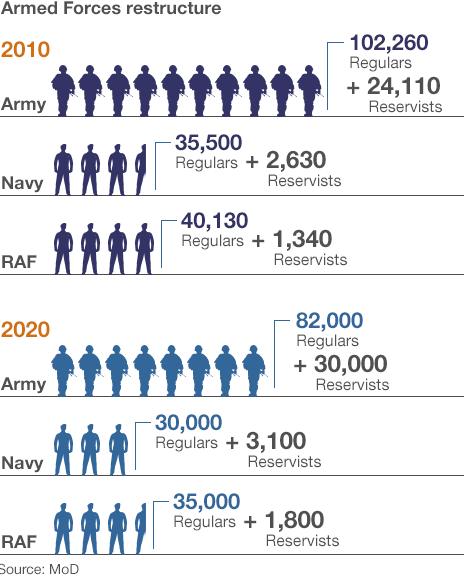Military cuts mean 'no US partnership', Robert Gates warns Britain
- Published
- comments
Robert Gates: "The UK won't have full spectrum capabilities or the ability to be a full partner"
UK armed forces cuts will limit the country's ability to be a major player on the world stage, ex-US defence secretary Robert Gates has warned.
The UK plans to cut 30,000 armed forces personnel by 2020, leaving 147,000.
The prime minister said Mr Gates was wrong and that the UK was a "first class-player in terms of defence".
Mr Gates also questioned whether "artificial" states in the Middle East "like Libya, Iraq and Syria can be held together absent of repression".
Mr Gates, who served under presidents Obama and Bush, told the BBC that was because they were made up of "historically adversarial groups".
And he said that although it was unlikely to happen, the US did have the capability to intervene in the Syrian conflict but lacked a "broader strategy to deal with the broader conflicts in the Middle East".
'Hollowed out'
On the UK's military cuts, Mr Gates told BBC Radio 4's Today programme: "With the fairly substantial reductions in defence spending in Great Britain, what we're finding is that it won't have full spectrum capabilities and the ability to be a full partner as they have been in the past."
The spectrum refers to the ability of a country's military to fight across air, sea and land.
Mr Gates singled out cuts to the Royal Navy as particularly damaging and he noted that - for the first time since World War One - Britain did not have an operational aircraft carrier.
Mr Gates warned against nuclear disarmament by the UK, but acknowledged that there was scope for changes to the way the deterrent was deployed.
Mr Gates's comments echo the concerns of other senior military figures.
The Chief of the Defence Staff, General Sir Nicholas Houghton, warned last month Britain could be left with the "spectre" of a hollowed-out force.
Admiral Lord West, the former First Sea Lord, told the BBC the government had underestimated how important the government's relationship with the US was and had not factored that in when deciding on the cuts.
He also said the gap with no aircraft carrier, between scrapping the Ark Royal and the introduction of a new aircraft carrier in 2020, represented a "huge risk".
Under the government's proposals, by 2020 the Army will lose 20,000 soldiers, the Royal Navy 6,000 personnel and the RAF 5,000 - although there are also plans to increase the number of reservists in each service.
Prime Minister David Cameron said he did not agree with Mr Gates's comments about Britain's future military capability.
"We have the fourth largest defence budget anywhere in the world. We are investing in future capabilities," he said.
"We are a first-class player in terms of defence and as long as I am prime minster that is the way it will stay."
Jonathan Beale, the BBC's defence correspondent said the American's latest intervention would be unlikely to reverse the cuts but would wound Britain's pride.

The Ministry of Defence said the UK - like the US - had had to take "tough decisions" on defence spending but had "the best trained and best equipped armed forces outside the US".
In a statement, it added: "Over the next decade, we plan to spend £160bn on equipment, to ensure our armed forces retain their formidable range of cutting-edge capabilities and ability to project power across the globe, including by maintaining our major naval presence in the Gulf Region.
"Construction of the first new aircraft carrier, the largest ship the Royal Navy has ever operated, is almost complete and the navy will also operate state-of-the-art Type 45 destroyers, new Type-26 Frigates, and seven new Astute Class submarines."
And former Defence Secretary Liam Fox told the Today programme Britain was "one of only four or five countries inside Nato" to meet the target of spending 2% of GDP on defence.
"America is the world's biggest economy with the world's biggest defence budget. We're the world's eighth biggest economy with the fourth biggest defence budget, so certainly we're pulling our weight on that," he said.
Shadow defence secretary Vernon Coaker said the prime minister should be worried about the concerns of "Britain's strongest ally".
Sir Christopher Meyer: "A great hole in defence capability'"
"It's clear that there needs to be a rebalancing after withdrawal from Afghanistan and the closure of bases in Germany," he said.
"And no-one is disputing the financial constraints within which the UK military must operate. But the government must ensure that Britain's defence capability is maintained."
Stop the War Coalition convenor Lindsey German said "many people in the country don't particularly like the special relationship with the US" and would not be concerned by Mr Gates's comments.
She said in times of austerity defence spending was the "wrong priority".
- Published19 December 2013
- Published6 November 2013
- Published9 January 2014